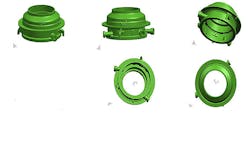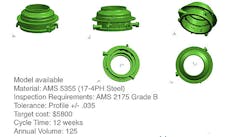GE Aviation Wants Alternatives to Investment Castings
Jet engine builder GE Aviation wants new options for manufacturing critical components — options better than the investment castings it presently uses to assemble its products — and has issued a design challenge for alternatives. The OEM has engaged NineSigma, “an open innovation services provider that connects organizations with external innovation resources to accelerate innovation,” to coordinate a competition, with financial rewards to the successful bidders in a contest to select alternative manufacturing methods.
To be successful, the proposed alternatives will be expected to improve on investment casting per-part production costs as well as per-part production time, “while maintaining or improving product quality and reliability.”
“New technologies are making the future of air travel possible,” NineSigma explained. “Advancing manufacturing techniques throughout the aviation industry at an equal rate is a key factor to making these technologies successful.
GE Aviation has been one of the most visible manufacturers adopting additive manufacturing technology or 3D printing to produce high-volume parts like fuel nozzles. Since 2013, it been producing fuel nozzles for the LEAP turbofan jet engine (supplied to Airbus, Boeing, and other commercial aircraft builders) via direct metal laser sintering at a plant in Auburn, AL.
“GE Aviation is constantly striving to improve efficiency and believes that developing the next generation manufacturing components like castings hinges upon our ability to improve efficiencies of the process and the capabilities of the materials that act as the DNA of global industry,” NineSigma continued.
Specifically, the challenges are to reduce the manufacturing cost of investment castings by 25%, with a target cost of $5,800; reduce the manufacturing cycle time to 12 weeks; achieve a typical annual value of 125 units; and improve tolerance controls so as to permit reduction of material and maintain minimum wall thickness.
Challenge participants are required to submit a detailed process proposal and data that demonstrates the viability of the process to produce the described part, stating the conformance to the dimensional and metallurgical requirements.
Up to six respondents will each receive a cash prize of $5,000 (total prize pool of up to $30,000), and the successful participants may be offered a role as a collaborator/supplier to GE. That may include “mentoring, funding for technical development, licensing, technology acquisition and/or collaboration toward commercialization, and may involve vendor assessments, technology discussions and post-Challenge negotiations,” according to NineSigma.
The original challenge was issued in December, and the deadline has been extended to February 18, 2015. The winning proposals will be announced in April.
The full details of the design challenge are available from NineSigma.
About the Author
Robert Brooks
Content Director
Robert Brooks has been a business-to-business reporter, writer, editor, and columnist for more than 20 years, specializing in the primary metal and basic manufacturing industries. His work has covered a wide range of topics, including process technology, resource development, material selection, product design, workforce development, and industrial market strategies, among others.

